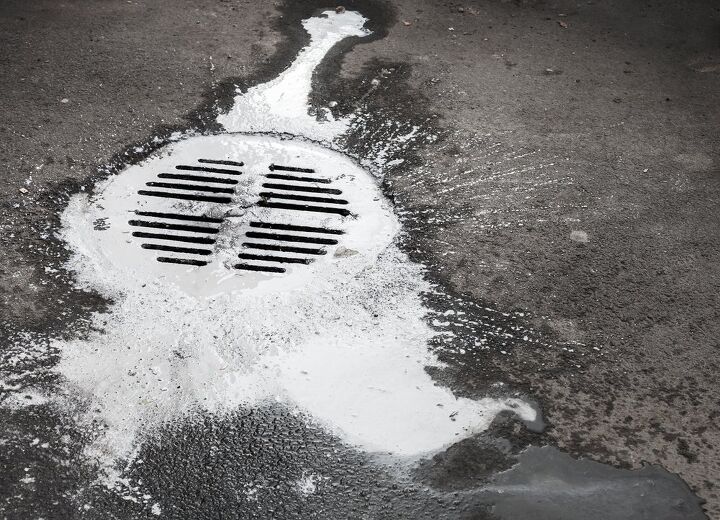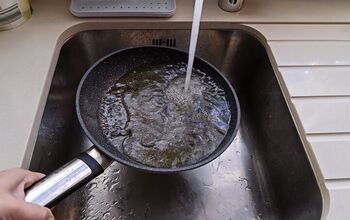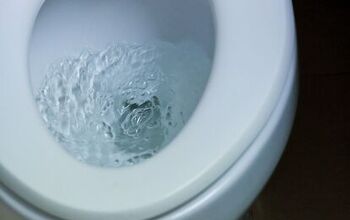Can You Pour Paint Down The Drain? (Find Out Now!)
Is it time to apply a fresh coat of paint to your house? Or maybe you’re an artist who frequently paints creations with acrylics or oil paints. Whatever the reason you have paint in your home, you’ve probably had this question: Can I pour leftover paint down the drain? Before you go dumping that unused paint into the sink, let’s explore the answer to this question.
No, you should NOT pour paint down the drain. Most paints can damage septic systems, harm the piping, and clog drains. When paint is poured down drains it can potentially seep into the ground, polluting groundwater and soil. Water-based paints can be dried and thrown away. Oil-based paints should be disposed of at a household hazardous waste drop-off.
Do You Need to Hire a Plumber?
Get free, zero-commitment quotes from pro contractors near you.

Why Can’t You Pour Paint Down the Drain?
There are multiple reasons why you should not pour paint down the drain.
- It is a waste of product. Unopened cans can be returned or donated to the store. Extra paint can be passed on to someone who can use it, or saved for a future house project.
- It is damaging to your septic system. Pouring paint down the drain, especially oil paint, is very bad for your septic. It can damage the pipes, harden and cause clogs in the drains.
- It can pollute water and soil. Never pour paint down a storm drain. It will make its way into the ground, which will pollute groundwater and the soil. Oil paints are considered hazardous waste, and should never make their way into the ground.
Oil-Based Paints vs. Water-Based Paints
Not all paints are created equal. When deciding what to do about your leftover paint, consider the differences between the two main types of paints: oil-based, and water-based latex.
Oil-Based Paints
Oil-based paints should never be poured down drains. These are not water soluble and can be extremely damaging to your septic system. They create clogs in the drains. If they end up in the ground, they will pollute the soil and groundwater, and have other harmful effects on the environment.
Oil-based paints should not be placed in the trash either, because they will end up in a landfill. Their chemicals can wreak havoc on the environment here as well.
Oil paints are not as safe as water-based paints because of their high flammability. Unlike water-based paints, they contain Volatile Organic Compounds (VOCs) like xylene and toluene. Oil paints are considered a hazardous material for these reasons.
That is why oil paint must be safely disposed of at a designated household hazardous waste drop-off. It can also be passed on to someone else who can utilize it.
Water-Based Latex Paints
While pouring latex paints down the drain is still not recommended, it is okay to rinse a little down the drain. Since these paints are water soluble and not hazardous, it is okay to wash off your paintbrush or tray in the sink. Be sure to keep the water running so the paint does not stick to the pipes.
Unlike oil paints, water-based latex paints can be thrown in the trash. Before doing so, ensure the paint has completely dried and solidified. Leaks from trash bags can cause big, messy issues for garbage collectors. It’s also bad for the environment if these leak into the ground.
Tips for Properly Disposing of Paint
Now that you know you shouldn’t pour leftover paint down the drain, you’re probably wondering how to safely get rid of it. Here are some useful tips for disposing of extra paint.
- Use it all up. It’s best to prevent this situation before it happens. Make sure to carefully consider how much paint you will realistically need for your project. You don’t want to end up with a full can of paint you can’t use. It’s better to have less than you need than way too much. Start by purchasing a smaller quantity, then getting more as needed.
- Throw away water-based paint. If you have a lot of extra water-based latex paint you don’t need, you can throw it in the trash. To do this, you will have to fully dry the paint first. Mixing it with kitty litter will speed up the drying process. You can also pour 1” layers of the paint into a cardboard box lined with newspaper. When all the layers are fully dried, throw away the cardboard box.
- Bring oil-based paint to a hazardous waste drop-off. Oil paints are considered hazardous waste. You cannot throw them in the trash or dump them in drains or outdoors. Contact your local government officials or check your town website to locate a household hazardous waste drop-off.
- Donate or pass it on. If you simply cannot find use for the spare paint yourself, you can offer it up to your network of friends and family. If the can is unopened, many theaters, art centers, and nonprofits accept paint donations. You may even be able to return it from the store you purchased it from.
Do You Need to Hire a Plumber?
Get free, zero-commitment quotes from pro contractors near you.

Related Questions
Why is paint hazardous waste?
Oil-based paints and stains are considered hazardous materials. That’s because of their flammability, and the presence of Volatile Organic Compounds (VOCs). Water-based latex paints are not considered hazardous, because they are inflammable. They also do not contain Volatile Organic Compounds. When disposing of paints at a hazardous waste drop-off, make sure the container is properly sealed and labeled.
How do I unclog paint from the drain?
Maybe you’ve already made the mistake of pouring too much paint down the drain, and now it’s clogged. If your sink is backing up, there are simple methods to unclog it. Try pouring baking soda down the drain, then ½ cup of distilled white vinegar. Let it sit for half an hour. Then pour a pot of boiling water down the drain to wash away the debris.
Can I rinse my paintbrush in the sink?
You can rinse your paintbrush in the sink, as long as it’s a water-based paint. Before you wash your brush, make sure to wipe off any excess paint with a paper towel or against the can’s rim. Excessive water-based paint can still clog the drain, so make sure to keep the flow of water running as you rinse off your brushes. Do not wash a paintbrush that contains oil-based paints in the sink.
Related Guide
More by Jessica Vaillancourt



























